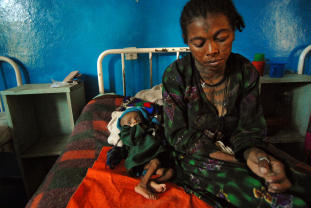 Children who don't succumb to hunger in Ethiopia instead face growing up stunted and sickly, a barrier to nation's progress
Children who don't succumb to hunger in Ethiopia instead face growing up stunted and sickly, a barrier to nation's progressWhen malnutrition doesn't kill
New York Times
Malnutrition still kills here, though Ethiopia's infamous famines are in abeyance. In Wag Hamra alone, the northern area that includes Shimider, at least 10,000 children under age 5 died last year, thousands of them from malnutrition-related causes.
Yet almost half of Ethiopia's children are malnourished, and most do not die. Some suffer a different fate. Robbed of vital nutrients as children, they grow up stunted and sickly, weaklings in a land that still runs on manual labor. Some become intellectually stunted adults, shorn of as many as 15 IQ points, unable to learn or even to concentrate.
'They're always behind'
There are many children like this in the villages around Shimider. Nearly six in 10 are stunted; 10-year-olds can fail to top an adult's belt buckle. They are frequently sick: diarrhea, chronic coughs and worse are standard for toddlers here. Most disquieting, teachers say, many of the 775 children at Shimider Primary are below-average pupils — often well below."They fall asleep," said Eteafraw Baro, a third-grade teacher at the school. "Their minds are slow, and they don't grasp what you teach them, and they're always behind in class."
Their hunger is a chronic, lifelong, irreversible handicap that scuttles their futures and cripples Ethiopia's hopes to join the developed world.
"It is a barrier to improving our way of life," said Dr. Girma Akalu, perhaps the nation's leading nutrition expert.
Ethiopia's problem is sub-Saharan Africa's curse. Five million African children under age 5 died last year — 40 percent of deaths worldwide — and malnutrition was a major contributor to half of those deaths. Sub-Saharan children under 5 died not only at 22 times the rate of children in wealthy nations, but also at twice the rate for the entire developing world.
But below the Sahara, 33 million more children under 5 are living with malnutrition. In U.N. surveys from 1995 to 2003, nearly half of sub-Saharan children under 5 were stunted or wasted, markers of malnutrition and harbingers of physical and mental problems.
Bleak as that may sound, the outlook for malnourished children in sub-Saharan Africa is better than in decades, thanks to an awakening to the issue — by selected governments.
South Africa provides nutrient-fortified flour to 30 million of its 46 million citizens. Nigeria adds vitamin A to flour, cooking oil and sugar. Ethiopia's government hopes to iodize all salt by year's end. U.N. programs now cover three in four sub-Saharan children with twice-a-year doses of vitamin A supplements.
Ethiopia may, in fact, have the most comprehensive program in all Africa — a joint venture with U.N. agencies that regularly screens nearly half of its 14 million children under 5 for health and nutrition problems.
Since 2004, the program has delivered vitamin A doses and deworming medicine to nine in 10 youngsters, vaccinated millions against diseases and delivered fortified food and nutrition education.
Lacking vital nutrients
But much of the continent has far to go.Well over half of sub-Saharan children under 5 lack iron, vital to developing nervous systems, the Micronutrient Initiative, a Canadian research organization, reported in 2004. They often have trouble concentrating and coordinating brain signals with movements, like holding a pencil, that are crucial to education.
Another 3.5 million children lack sufficient iodine, which can lower a child's IQ by 10 or more points. More than a half million suffer vitamin A deficiency, which cripples young immune systems; merely ensuring adequate vitamin A can lower child mortality by more than one-fifth.
Children lacking vitamin B12, regularly measured nowhere in Africa, have impaired cognitive skills and do poorly on tests.
Many African children sometimes receive nutrient supplements, courtesy of the World Food Program, UNICEF and charities.
Still, donors cannot meet the need. In Ethiopia, for example, a venture between the government and U.N. agencies is caring for 20,000 acutely malnourished children in 100 locations.
"But we can count 70,000," said Iqbal Kabir, the chief nutrition expert at UNICEF offices in Addis Ababa, Ethiopia's capital. "We can't treat them all."

















No comments:
Post a Comment